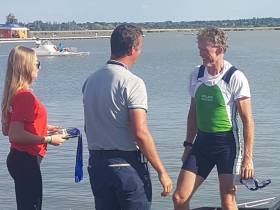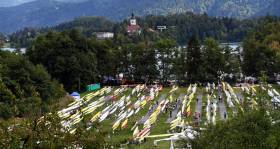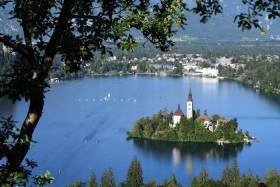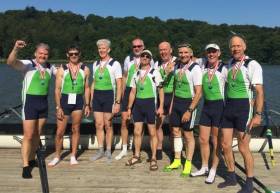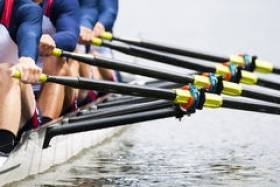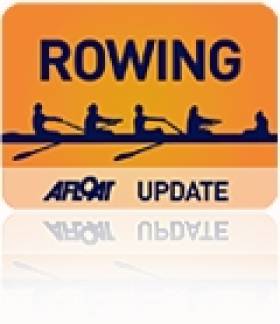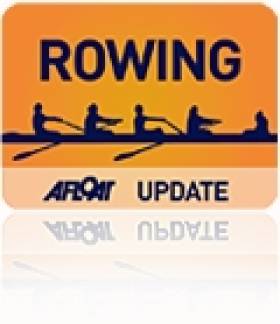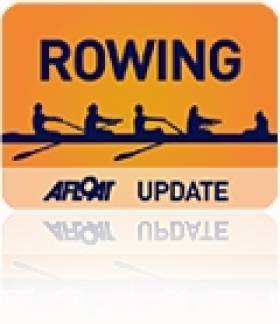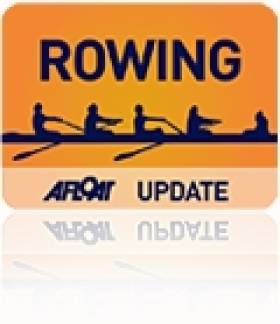Displaying items by tag: Belfast Boat Club
Crowley Leads Ireland to More Masters Wins in Hungary
#Rowing: Irish crews added four more wins to their haul over the weekend at the World Masters Regatta at Lake Velence in Hungary. The wins came on Saturday. Denis Crowley featured in a composite eight, which beat strong British opposition, and in a four – bringing his personal tally to eight wins. Brendan Smyth and Patrick Fowler of Commercial won in the double and Milo and Pat Murray of Cappoquin won the in the pair. A mixed eight finished second on Sunday.
World Masters Regatta, Lake Velence, Hungary (Selected Results; Irish interest; Winners)
Saturday
Men
Eight (E – avg 55 or more): Galway, Belfast BC, Neptune, Clonmel, Commercial, Shannon (G Murphy, A McCallion, K McDonald, D Crowley, F O’Toole, O McGrath, G O’Neill, C Hunter, M McGlynn) 3:04.90
Four (D – avg 50 or more): Commercial, Neptune (B Smyth, F O’Toole, G Murphy, D Crowley) 3:24.72.
Pair (F – avg 60 or more): Cappoquin (P Murray, M Murray) 6:12.10.
Sculling, Double (C – avg 43 or more): Commercial (B Smyth, F Fowler) 3:28.39.
Sweet Win For Irish Composite Eight at World Masters
#Rowing: One of the leading Irish boats at the World Masters Regatta in Bled in Slovenia clocked up a notable win today. The E eight made up of competitors from Belfast Boat Club, Commercial, Neptune and Waterford beat Dynamo of Russia, who have been their constant rivals of recent years. The margin was extremely tight – just .26 of a second.
World Masters Regatta, Bled, Slovenia, Day Four
Men
Eight ‘E’ (Avg 55 or more) – Heat Three: Waterford, Neptune, Commercial, Belfast BC (A Penkert, J Hudson, D Crowley, G Murphy, M Heavey, C Dickson, C Hunter, F O’Toole, D McGuinness) 3:07.88.
Irish Crews Win at World Masters Regatta
#Rowing: Irish composite crews had good wins on the first day of the World Masters Regatta in Bled in Slovenia. The Irish B eight (average age 36 or more), which is formed from six clubs won. Two fours in the E class (average age 55 or more) also won – the Galway/Neptune combination by just .26 of a second. The decision was initially given to their German opponents.
World Masters Regatta, Bled, Slovenia, Day One (Selected Results; Irish interest; all heats of 1,000 metres, winners only)
Men
Eight, B (avg 36 or more) – Heat Five: Galway, Commercial, Shandon, Clonmel, Neptune, Cork 3:05.51.
Four, E (avg 55 or more) – Heat One: Galway, Neptune 3:26.26.
Heat Four: Waterford, Neptune, Commercial, Belfast BC 3:28.1
Irish Masters Eight are Afloat Rowers of Month
#Rowing: The Irish eight which won at the World Masters Regatta at Lake Bagsvaerd, Denmark, have been chosen as the Afloat Rowers of the Month for September. There were a number of good results by Irish crews at the event, which is one of the biggest international events of the year. Among the competitors this year was Denmark legend Eskild Ebbesen. The Irish E eight (55 years or older), was drawn from five clubs (Commercial, Belfast Boat Club, Neptune, Old Collegians and Waterford Boat Club) and outpaced German and British rivals in a field of seven crews. They had also won last year at this level. The crew was: John Hudson, Denis Crowley, Gerry Murphy, Mick Heavey, Colin Dickson, Colin Hunter, Fran O’Toole, Donal Mc Guinness and cox Al Penkert.
Rower of the Month awards: The judging panel is made up of Liam Gorman, rowing correspondent of The Irish Times, and David O'Brien, editor of Afloat magazine. Monthly awards for achievements during the year will appear on afloat.ie and the overall national award will be presented to the person or crew who, in the judges' opinion, achieved the most notable results in, or made the most significant contribution to rowing during 2016. Keep a monthly eye on progress and watch our 2016 champions list grow.
Ireland Crews Win at World Masters Rowing
#Rowing: Irish crews were amongst the winners again at the World Masters Regatta in Denmark today. Denis Crowley of Commercial and Niall O’Brien of Carlow won in the men’s single sculls for competitors 50 years or more and the Belfast Boat Club women’s coxed four (average age 60 or more) also won.
World Masters Regatta, Copenhagen (Irish interest - Winners; 1,000m)
Men
Single Sculls - D (average age 50 years or more) - Heat Two: Carlow Rowing Club (N O’Brien) 3:58.63. Heat 10: Commercial (D Crowley) 4:08.63.
Women
Four, coxed - F (average age 60 years or more) - Heat One: Belfast Boat Club 4:42.79.
#ROWING: The men’s junior coxed four was the standout race of the morning session at the Irish Rowing Championships at the National Rowing Centre in Cork today. It took a photo finish to confirm Cork Boat Club’s win over Presentation, with Portora also disputing the lead right to the last 50 metres.
Cork Boat Club also took the women’s junior single sculls title through Oisin Forde, who won a fine battle with Jasmine English of Belfast Boat Club. Forde is from Torrevieja in Spain and with her sister Dervla, who was third, will represent Ireland at the Coupe de la Jeunesse next month.
The men’s senior pair final gave Mark O’Donovan and Niall Kenny of UCD a chance to show why they are in the frame to represent Ireland at the World Championships this year, while a former international Fiola Foley partnered a current one, Monika Dukarska to win the women’s intermediate doubles title.
Irish Rowing Championships, National Rowing Centre, Cork (Selected Results; Finals)
Men
Eight – Intermediate: 1 Trinity 5:46.25, 2 NUIG 5:50.28, 3 UCD 5:56.96.
Four, coxed – Junior: 1 Cork BC 6:35.99, 2 Presentation 6:36.22, 3 Portora 6:38.08.
Pair – Senior: 1 UCD (M O’Donovan, N Kenny) 6:46.05, 2 NUIG 6:49.95, 3 Commercial B 7:00.16.
Sculling
Single: Lee (D O’Sullivan) 7:31.80, 2 St Michael’s (P O’Connor) 7:36.24, 3 Belfast BC (A Murray) 7:39.44.
Women
Eight – Novice: 1 Queen’s 7:19.74, 2 Trinity 7:55.75.
Sculling, Double – Intermediate: 1 Killorglin (F Foley, M Dukarska) 7:17.17, 2 Commercial 7:20.83, 3 Skibbereen 7:39.99.
Single – Junior: 1 Cork BC (O Forde) 8:06.14, 2 Belfast BC (J English) 8:07.11, 3 Commercial B 7:00.16.
Belfast Boat Club Rowers Fall To American Opponents
#RowingHenley: Belfast Boat Club led early on in their race against Union Boat Club in the Britannia Cup at Henley Royal Regatta, but the heavier crew from America came through to win well at the end. Union BC were the selected (seeded) crew.
Henley Royal Regatta, Day Two (Irish interest)
Temple Cup (Eights, Student): St Petersburg University, Russia bt University College, Dublin 2 ½ l 6:51
Visitors’ Cup (Four, Intermediate): Harvard A bt University College, Dublin 2l, 6:56.
Prince Albert (Coxed Fours, Student): Isis Boat Club bt Trinity College, Dublin 1 ¼ l, 7:27
Britannia (Coxed Fours, Club): Union Boat Club, United States bt Belfast Boat Club 3l, 7:29
Prince of Wales: Commercial, Dublin bt Poplar Blackwall and District Rowing Club and Anglia Ruskin Boat Club 1 ¾ l, 7:20
Mixed Fortunes for Irish at Henley Qualification Regatta
# ROWING HENLEY QUALIFIERS: The qualifying races for Henley Royal Regatta last evening did not bring joy for Galway Rowing Club. Two crews competed in the Junior Women’s Quadruple, but failed to qualify for the regatta, which begins on Wednesday.
Belfast Boat Club pulled off a fine result in qualifying for the Britannia, a club coxed fours event. They were one of just three of eight crews to qualify.
However, the Queen’s University eight did not make it through the qualifiers to the draw of the Temple Cup.
# ROWING: The Rowing Ireland talent identification programme run by Nathan Adams in Belfast provided the fastest female and male single scullers at the Lagan Scullers’ Head of the River on Saturday. Up-and-coming talents Gareth McKillen and Bridget Jacques topped the rankings. A Belfast Boat Club/RBAI composite coxed quadruple scull was the fastest crew of the day.
Lagan Sculler’s Head of the River, Belfast, Saturday (Selected Results)
Race One: 1 Bann women’s senior quadruple sculls 12:39.8, 2 Belfast BC women sen quad 12:41.8, 3 RBAI junior single sculls (G McKillen) 13:03.1, 4 BBC/Portora masters double sculls 13:03.8, 5 BBC senior single (Wray) 13:05.9, 6 Lagan sen single (Darby) 13:06.3; 9 Portadown nov single (McKeown) 13:34.1; 15 Bann wom nov coxed quad 14:02.6.
Race Two: BBC/RBAI men sen quad 11:04.5, 2 Lagan Scullers’ men sen quad 11:46.9, 3 Methodist College jun 18A double sculls 12:38.9, 4 Lagan Scullers’ Masters single (Darby) 13:03.7, 5 RBAI jun 16 coxed quad 13:04.7, 6 Coleraine AI double sculls 13:08.1; 8 Portadown inter single (McKeown) 13:30.4; 9 Bann women’s sen double 13:36.0, 15 Bann women’s jun 16 coxed quad 14:16.7.
Race Three: 1 Methodist College jun 18A quad 11:53.8, 2 Coleraine AI jun 18B coxed quad 12:32.8, 3 Methody quad (time only) 12:42.1, 4 BBC/Lagan Scullers’ quad (mixed, time only) 12:54.5, 5 Methody women’s jun 18A quad 13:29.4, 6 Belfast BC women’s sen single (B Jacques) 13:49.6; 8 Bann women’s jun 16 double 14:13.8; 16 BBC women’s nov single (Turner) 14:50.5; 17 Portadown women’s jun 18A quad 14:57.6.


























